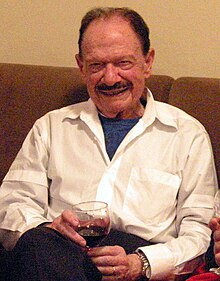Francisco Mauro Salzano
Francisco Mauro Salzano (born July 27, 1928 in Cachoeira do Sul ; † September 28, 2018 in Porto Alegre ) was a Brazilian geneticist . He was a pioneer in genetics research in Brazil and a professor emeritus at the Universidad Federal do Rio Grande do Sul (UFRGS).
biography
Francisco Salzano was born in Cachoeira do Sul in 1928. Since his father was a doctor and director of the Department of Health, Francisco would also become a medical doctor. But he did not pass the entrance exam. Francisco Salzano then took a course in natural history at the Universidade Federal do Rio Grande do Sul. In this way he was able to enter the biological department of the 1940s. In the third year of his studies he dealt with zoology , later he became interested in genetics . Francisco received an invitation from his professor Antonio Rodrigues Cordeiro to study genetics in his laboratory. He would then make a career in this field for decades.
At the Universidade Federal do Rio Grande do Sul as a professor emeritus and research assistant in the Department of Genética do Instituto de Biociências he was also a permanent member of the core of the program for postgraduates in genetics and molecular biology ( Programa de Pós-Graduação em Genética e Biologia Molecular ) .
In 1994, Salzano was honored by the Brazilian government with the highest national award, the Prêmio Almirante Álvaro Alberto for Science and Technology . He was also honored in 1995 for his scientific merits with the great cross of the country ( Grã-Cruz da Ordem Nacional do Mérito Científico ) by the President of Brazil. In 1997 and 1999 he was honored with the "Annual Award" of the Ibero-American Society of Human Genetics and the "Franz Boas High Achievement Award" of the Human Biology Association . He received an honorary doctorate ( Doctor Honoris Causa ) from the University of Paul Sabatier (French: Université Paul Sabatier Toulouse III , abbr. UPS) in France in 2010 ; as well as 20 other awards. Francesco Salzano was a foreign member of the National Academy of Sciences ( USA ) since 1999 and of the Academia Brasileira de Ciências since 1973 .
Francisco Salzano has worked on numerous publications, including over 449 complete and internationally published papers and 117 general and scientific articles. As an author and co-author, he has been quoted in at least 21 works. In addition, 18 books and 52 book chapters are among his works.
Salzano contributed to the training of more than 40 doctors and masters in his life.
He died on September 28, 2018 and was buried in Porto Alegre.
Works (selection)
- Francisco Mauro Salzano, AM Hurtado (2004): Lost paradises and the ethics of research and publications. Oxford, UK: Oxford University Press.
- Francisco Mauro Salzano, Maria Cátira Bortolini (2002): The Evolution and Genetics of Latin American Populations . Cambridge: Cambridge University press, 2002.
- Francisco Mauro Salzano, Sídia Maria Calegari-Jacques (1988): South American Indians: A case study in Evolution. Oxford, UK: Clarendon Press, 1988.
- Francisco Mauro Salzano, V. Sune, M. Ferlauto (1967): New studies on the relationship between blood groups and leprosy. In: Acta Genetica et Statistica Medica , 17 (6), 530-544.
- Francisco Mauro Salzano (1967): Blood groups and leprosy. In: Journal of Medical Genetics , 4 (2), 102-106.
- Francisco Mauro Salzano (1957): The blood groups of South American Indians. In: American Journal of Physical Anthropology , 15 (4), 555-579.
Individual evidence
- ^ Morre Francisco Mauro Salzano, precursor da pesquisa genética no Brasil . G1.
- ↑ a b UFRGS decreta luto oficial pelo falecimento de Francisco Mauro Salzano . Federal University of Rio Grande do Sul .
- ↑ Francisco Salzano: To geneticista de opiniões polêmicas | Revista Pesquisa Fapesp. Retrieved October 29, 2019 (Brazilian Portuguese).
- ↑ PPGBM - Home. August 8, 2010, accessed October 29, 2019 .
- ↑ UFRGS decreta luto oficial de pelo falecimento Francisco Mauro Salzano. Retrieved October 29, 2019 (Brazilian Portuguese).
- ^ Academia Brasileira de Ciências. December 1, 2010, accessed October 29, 2019 .
- ↑ Diretório Grupos de Pesquisas - CNPq
- ^ Francisco Mauro Salzano, Maria Cátira Bortolini: The Evolution and Genetics of Latin American Populations. Cambridge University Press, Cambridge 2002 ( cambridge.org [PDF; accessed October 31, 2019]).
| personal data | |
|---|---|
| SURNAME | Salzano, Francisco Mauro |
| BRIEF DESCRIPTION | Brazilian geneticist |
| DATE OF BIRTH | July 27, 1928 |
| PLACE OF BIRTH | Cachoeira do Sul |
| DATE OF DEATH | 28th September 2018 |
| Place of death | Porto Alegre |
